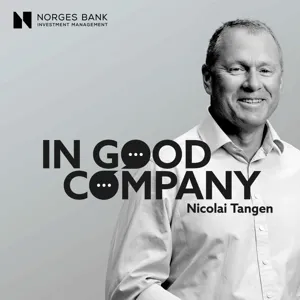Podcast Summary
From Sound to Innovation: Sony's Evolution: Sony, with a legacy rooted in sound and innovation, has shifted focus from physical products to digital content and creativity, investing $17B long-term, recognized for its impressive legacy and relevance, prioritizing entertainment and creativity for innovation.
Sony, a company with a rich history rooted in sound and innovation, has continuously expanded its business through electronics, entertainment, and semiconductors. Its CEO, Kenichiro Yoshida, discussed the company's origins and its shift in focus from physical products to digital content and creativity. With a long-term investment of over $17 billion, the Norwegian sovereign wealth fund recognizes Sony's impressive legacy and its continued relevance in today's market. Yoshida highlighted the importance of entertainment as the company's purpose and its focus on creativity as a means to pursue innovation. Notably, Steve Jobs, a significant figure in technology and entertainment, admired Sony for its groundbreaking products and its commitment to sound. Sony's history is marked by game-changing products, from the Walkman to PlayStation, and its dedication to pushing the boundaries of technology and emotion.
Sony's focus on fostering creativity and innovation through content investment: Sony divested from battery and display panel businesses to concentrate on CMOS image sensors and invest in content, leading to success in areas like PlayStation Network and Crunchyroll, while maintaining a culture that embraces learning from failures and long-term thinking for sustainability.
Sony has been focusing on fostering creativity and innovation by investing in content, specifically in the areas of games, music, and pictures. This shift began when the company divested from battery and display panel businesses and concentrated on CMOS image sensors for use in smartphone cameras. Sony's CEO, Kenichiro Yoshida, values a corporate culture that embraces learning from failures and encourages long-term thinking. An example of this is Sony's experience with a previous DTC service, which led the company to focus on specific communities and entertainment niches like PlayStation Network and Crunchyroll. Despite the challenges of maintaining a culture that embraces failure in Japan, Sony continues to prioritize long-term thinking and sustainability for all stakeholders, including the planet.
Embracing diversity and learning from mistakes foster growth and innovation: Sony's success stems from a balance between long-term employment, fostering diverse experiences, and learning from failures
While long-term employment and a strong company culture, such as that of Sony, can provide valuable experience and continuity, it's also essential to seek out diverse backgrounds and experiences to foster growth and innovation. Additionally, embracing failure and learning from mistakes is a crucial aspect of personal and professional development. In terms of business, Sony's approach to gaming is to make it ubiquitous and expand beyond traditional consoles to PC, mobile, and cloud. They also offer a hybrid subscription model to cater to various consumer preferences. Regarding perfectionism, it's more beneficial to learn from mistakes than to strive for unattainable perfection. A notable example of this is Sony's failed PlayStation Vue service, which ultimately led to valuable lessons. Sony's role in the music industry is to support and foster artists and songwriters globally, with a roster including Beyonce, Harry Styles, and Sisa. Personal relationships between industry leaders and musicians have been a significant part of Sony's history, showcasing the importance of collaboration and mutual respect.
Sony's Approach to AI in Entertainment: Collaboration, Not Replacement: Sony uses AI as a tool to enhance content creation and streamline processes, focusing on becoming a strategic supplier in the movie business through partnerships and direct content delivery.
Sony, as a leader in the entertainment industry, is leveraging AI as a supportive technology rather than a replacement for creators. The company focuses on becoming a strategic supplier in the movie business by partnering with distributors and directly delivering content to users in specific categories. AI is seen as a tool to enhance content creation and streamline processes, such as game development. Ken Ishizaka, a Sony executive, emphasized the importance of communication and a long-term vision for balancing profits and innovation. He also shared that his experience as a president at Sony, particularly the shift towards network entertainment and the company's name change, significantly influenced his leadership style. Overall, Sony's approach to AI in entertainment is about collaboration between technology and creators, rather than replacement.
Appreciating differences: Diversity brings unique perspectives and strengths, embrace it in personal and professional life, learn from failures, and continuously grow
Diversity, whether in individuals on the autism spectrum or in a large corporation like Sony, brings unique perspectives and strengths. The father in this conversation shares his experience of spending weekends with his autistic son, who has a different way of communicating but teaches him valuable lessons about appreciating differences. As a leader at Sony, which employs over 110,000 people with diverse backgrounds and businesses, he strongly believes in leveraging this diversity as a strength. His advice to young people is to always challenge themselves and learn from their failures, as he did when trying new things throughout his career. Through these experiences, he continues to grow and learn.






